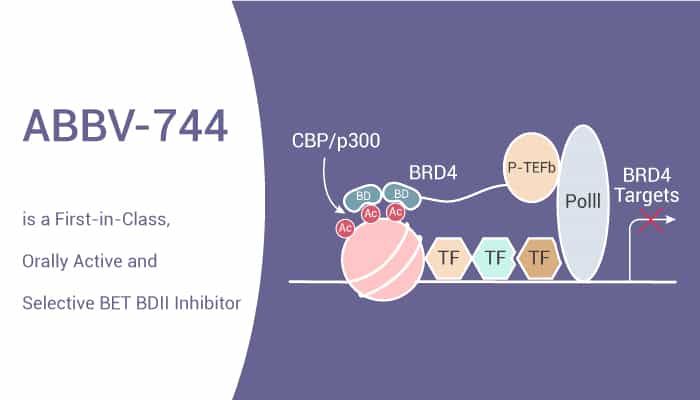The proteins of BET (bromodomain and extra-terminal) domain family are epigenetic readers. BET domain family proteins bind acetylated histones through their bromodomains to regulate gene transcription.
BET domain family proteins consist of BRD2, BRD3, BRD4 and BRDT. They contain BDI, BDII and the extra-terminal (ET) domain. Interestingly, BDII of all the BET proteins is necessary following a stimulus that drives rapid gene induction. Moreover, selective inhibition of BDII affects gene expression induction, while maintaining established transcriptional programs largely unchanged. In addition, inhibitor of BDII can be used for the research of cancer disease, such as prostate cancer.
In this article, we will introduce a first-in-class, orally active and selective BET BDII inhibitor, ABBV-744.

Generally, this compound has the potential to study prostate cancer. In addition, ABBV-744 inhibits BDII with IC50 8 nM and 13 nM for BRD2 and BRD3, respectively. Particularly, ABBV-744 inhibits BDII with IC50 4 nM and 18 nM for BRD4 and BRDT, severally.
A research found that ABBV-744 downregulated the expression of KLK2 and MYC genes in lymph node carcinoma of the prostate (LNCaP) cells. Moreover, ABBV-744 induced cell cycle arrest in G1 followed by senescence. Certainly, the results suggest that ABBV-744 has excellent anti-cancer effect. In rats, separate pharmacokinetic studies determine ABBV-744 administration exposure levels. Consequently, these show that a central role for BET BDII in anti-cancer models systems and the selectivity of ABBV-744.
In conclusion, ABBV-744 is a first-in-class, orally active and selective BET BDII inhibitor. ABBV-744 inhibits cancer and regulates immune, could provide an effective study for prostate cancer.
References:
Gilan O, et al. Science. 2020 Apr 24;368(6489):387-394.